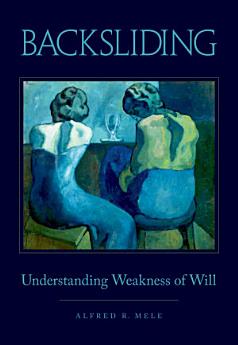Backsliding: Understanding Weakness of Will
jun. 2012 · Oxford University Press
E-knjiga
192
Strani
family_home
Primerno
info
reportOcene in mnenja niso preverjeni. Več o tem
O tej e-knjigi
People backslide.They freely do things they believe it would be best on the whole not to do -- a judgment developed from their own point of view, not just the perspective of their peers or their parents. The aim of this book is to to clarify the nature of backsliding - of actions that display some weakness of will -- using traditional philosophical techniques that date back to Plato and Aristotle (whose work on weakness of will or "akrasia" he discusses) and some new studies in the emerging field of experimental philosophy. Mele then attacks the thesis that backsliding is an illusion because people never freely act contrarily to what they judge is best. He argues that it is extremely plausible that if people ever act freely, they sometimes backslide. At the book's heart is the development of a theoretical and empirical framework that sheds light both on backsliding and on exercises of self-control that prevent it. Here, Mele draws on work in social and developmental psychology and in psychiatry to motivate a view of human behavior in which both backsliding and overcoming the temptation to backslide are explicable. He argues that backsliding is no illusion and our theories about the springs of action, the power of evaluative judgments, human agency, human rationality, practical reasoning, and motivation should accommodate backsliding.
O avtorju
Alfred R. Mele is the William H. and Lucyle T. Werkmeister Professor of Philosophy at Florida State University. He is the author of six previous OUP books: Irrationality (1987), Springs of Action (1992), Autonomous Agents (1995), Motivation and Agency (2003), Free Will and Luck (2006), and Effective Intentions (2009). He also is the editor of The Philosophy of Action (OUP 1997) and a coeditor of four other OUP volumes: Mental Causation (1993), The Oxford Handbook of Rationality (2004), Rationality and the Good (2007), and Free Will and Consciousness: How Might They Work? (2010).
Ocenite to e-knjigo
Povejte nam svoje mnenje.
Informacije o branju
Pametni telefoni in tablični računalniki
Namestite aplikacijo Knjige Google Play za Android in iPad/iPhone. Samodejno se sinhronizira z računom in kjer koli omogoča branje s povezavo ali brez nje.
Prenosni in namizni računalniki
Poslušate lahko zvočne knjige, ki ste jih kupili v Googlu Play v brskalniku računalnika.
Bralniki e-knjig in druge naprave
Če želite brati v napravah, ki imajo zaslone z e-črnilom, kot so e-bralniki Kobo, morate prenesti datoteko in jo kopirati v napravo. Podrobna navodila za prenos datotek v podprte bralnike e-knjig najdete v centru za pomoč.








